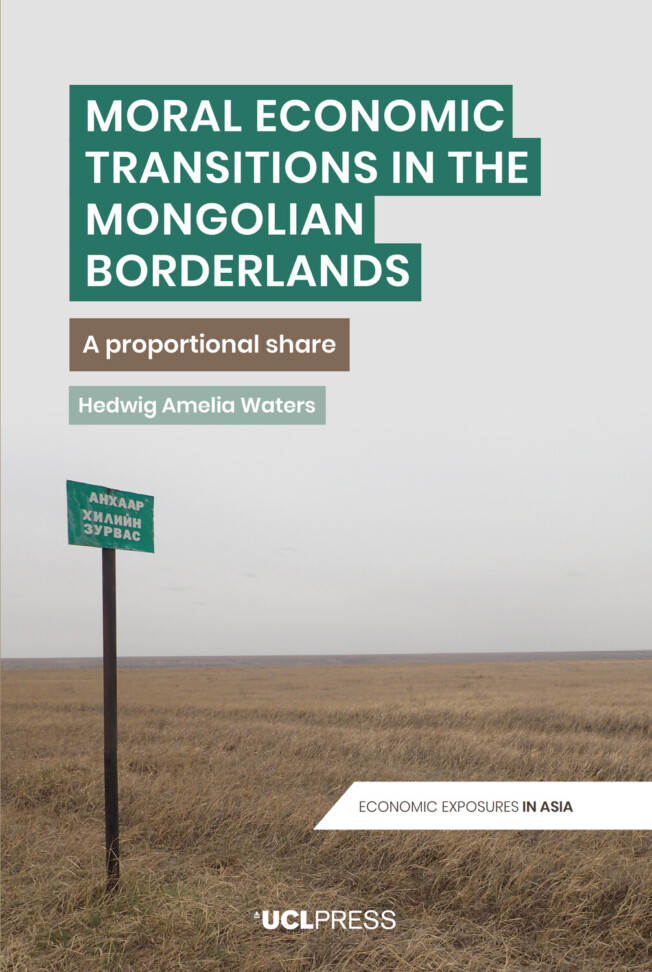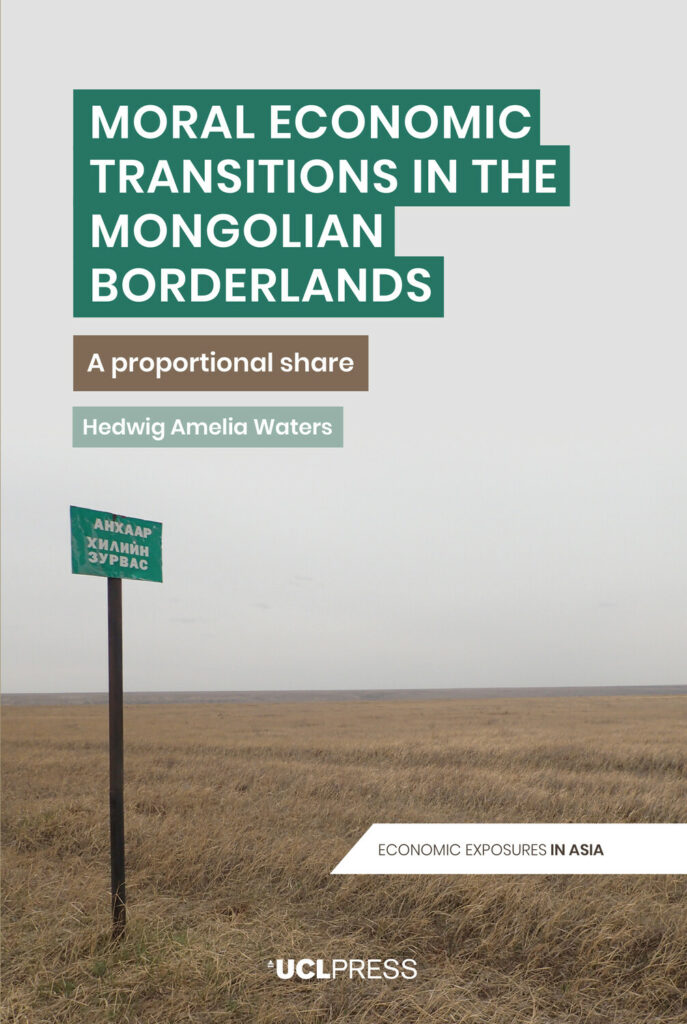
Moral Economic Transitions in the Mongolian Borderlands
A proportional share
Hedwig Amelia Waters (Author)
Series: Economic Exposures in Asia
Since the early 1990s, Mongolia began its hopeful transition from socialism to a market democracy, becoming increasingly dependent on international mining revenue. Both shifts were promised to herald a new age of economic plenty for all. Now, roughly 30 years on, many of Mongolia’s poor and rural feel that they have been forgotten.
Moral Economic Transitions in the Mongolian Borderlands describes these shifts from the viewpoint of the self-proclaimed ‘excluded’: the rural township of Magtaal on the Chinese border. In the wake of socialism, the population of this resource-rich area found itself without employment and state institutions, yet surrounded by lush nature 30 kilometres from the voracious Chinese market. A two-tiered resource-extractive political-economic system developed. Whilst large-scale, formal, legally sanctioned conglomerates arrived to extract oil and land for international profits, the local residents grew increasingly dependent on the Chinese-funded informal, illegal cross-border wildlife trade. More than a story about rampant capitalist extraction in the resource frontier, this book intimately details the complex inner worlds, moral ambiguities and emergent collective politics constructed by individuals who feel caught in political-economic shifts largely outside of their control.
Offering much needed nuance to commonplace descriptions of Mongolia’s post-socialist transition, this study presents rich ethnographic detail through the eyes and voices of the state’s most geographically marginalized. It is of interest not only to experts of political-economy and post-socialist transition, but also to non-academic readers intrigued by the interplay of value(s) and capitalism.
List of figures
List of tables
Acknowledgements
Note on transliteration
Note on currency conversion
Note on anonymization, activities and location
Introduction: Moral economic dichotomizations
1 Defending the beautiful homeland
2 A proportional share
3 The moral economy of Dalai fishermen
4 An overheated economy of favours
5 The financialization of help
Conclusion: two-way capitalist adaptations
Bibliography
Index
DOI: 10.14324/111.9781787358133
Number of illustrations: 17
Publication date: 15 June 2023
PDF ISBN: 9781787358133
EPUB ISBN: 9781787358164
Read Online ISBN: 9781787358133
Hardback ISBN: 9781787358157
Paperback ISBN: 9781787358140
Hedwig Amelia Waters (Author) 
Hedwig Amelia Waters is Horizon Europe ERA Postdoctoral Fellow at Palacky University, Czech Republic.
‘Discusses the moral economic dichotomies that have emerged in Magtaal, Mongolia, describing how they emerged due to its increased emplacement within larger political-economic systems perceived to be largely outside of local control’
Journal of Economic Literature
‘Waters does a superb job guiding the reader into the ruptured cosmologies and precarious economies of Magtaal residents and their attempts to ameliorate their situation that often require taking from the back seam to mend the front.’
Journal of Asian Studies
‘Meticulously researched and insightful… The book invites readers to consider the broader impacts of market forces on local cultures and is a significant contribution that will resonate with both academic and general audiences. It offers valuable insights into how communities adapt to external pressures while preserving cultural identities, making it an important addition to understanding Mongolia’s.’
Studies of Transition States and Societies
Listen to the author of Moral Economic Transitions in the Mongolian Borderlands
Listen to Hedwig Amelia Waters discuss Moral Economic Transitions in the Mongolian Borderlands on the New Books Network: East Asia Studies podcast
Listen to Hedwig Amelia Waters discuss Moral Economic Transitions in the Mongolian Borderlands on the New Books Network: Economics podcast
Related titles
Environment and Post-Soviet Transformation in Kazakhstan’s Aral Sea Region
William Wheeler,
25 October 2021
Moral Economic Transitions in the Mongolian Borderlands
A proportional share
Since the early 1990s, Mongolia began its hopeful transition from socialism to a market democracy, becoming increasingly dependent on international mining revenue. Both shifts were promised to herald a new age of economic plenty for all. Now, roughly 30 years on, many of Mongolia’s poor and rural feel that they have been forgotten.
Moral Economic Transitions in the Mongolian Borderlands describes these shifts from the viewpoint of the self-proclaimed ‘excluded’: the rural township of Magtaal on the Chinese border. In the wake of socialism, the population of this resource-rich area found itself without employment and state institutions, yet surrounded by lush nature 30 kilometres from the voracious Chinese market. A two-tiered resource-extractive political-economic system developed. Whilst large-scale, formal, legally sanctioned conglomerates arrived to extract oil and land for international profits, the local residents grew increasingly dependent on the Chinese-funded informal, illegal cross-border wildlife trade. More than a story about rampant capitalist extraction in the resource frontier, this book intimately details the complex inner worlds, moral ambiguities and emergent collective politics constructed by individuals who feel caught in political-economic shifts largely outside of their control.
Offering much needed nuance to commonplace descriptions of Mongolia’s post-socialist transition, this study presents rich ethnographic detail through the eyes and voices of the state’s most geographically marginalized. It is of interest not only to experts of political-economy and post-socialist transition, but also to non-academic readers intrigued by the interplay of value(s) and capitalism.
‘Discusses the moral economic dichotomies that have emerged in Magtaal, Mongolia, describing how they emerged due to its increased emplacement within larger political-economic systems perceived to be largely outside of local control’
Journal of Economic Literature
‘Waters does a superb job guiding the reader into the ruptured cosmologies and precarious economies of Magtaal residents and their attempts to ameliorate their situation that often require taking from the back seam to mend the front.’
Journal of Asian Studies
‘Meticulously researched and insightful… The book invites readers to consider the broader impacts of market forces on local cultures and is a significant contribution that will resonate with both academic and general audiences. It offers valuable insights into how communities adapt to external pressures while preserving cultural identities, making it an important addition to understanding Mongolia’s.’
Studies of Transition States and Societies

